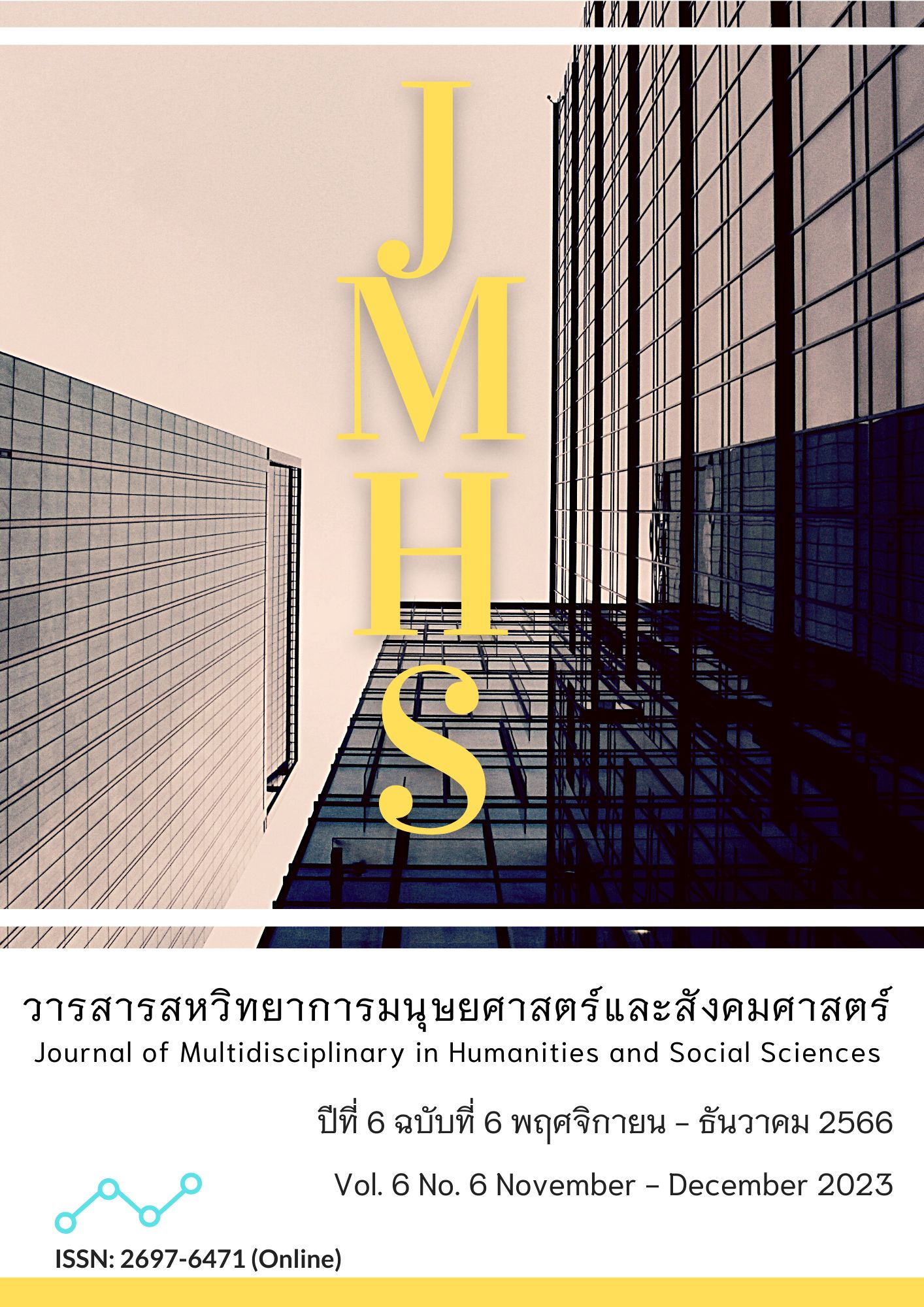Doing Good According to Sufficiency Economy Philosophy
Main Article Content
Abstract
The objective of this research article was threefold: 1) to study the doing good according to the philosophies of utilitarianism and deontological ethics; 2) to study the doing good according to the sufficiency economy philosophy; and 3) to analyze the doing good according to the sufficiency economy philosophy. The research was qualitative, involving content analysis and narrative description. The research findings were summarized as follows: 1) The study of doing good according to the philosophies of utilitarianism and deontological ethics reveals different perspectives. According to Jeremy Bentham's utilitarianism, doing good involves achieving positive outcomes that result in personal well-being. Bentham's philosophy suggests that individuals who benefit themselves fully will eventually contribute to the well-being of others, leading to overall positive consequences. On the other hand, John Stuart Mill's utilitarianism emphasizes similar positive outcomes, but with a focus on greater collective well-being. Mill suggests that societal well-being is pivotal and that individual well-being should be considered equally. In the context of adhering to deontological ethics, doing good involves performing actions that stem from having good intentions and fulfilling one's ethical responsibilities. The motivation behind carrying out these duties is guided by practical reasoning. 2) The study of doing good according to the Sufficiency Economy philosophy revolves around achieving goodness through balance and moderation. Economic sufficiency advocates for actions that avoid excessive self-indulgence and harm to others. This philosophy promotes doing good based on wisdom and mindfulness; 3) The analysis of Doing Good According to the Sufficiency Economy Philosophy demonstrates that it involves both intent and consequences. This approach promotes ethical actions that are creative, considerate of oneself and others, and rooted in wisdom, moderation, and mindfulness. In conclusion, the core virtues identified from the research were: (1) truthfulness and sincerity; (2) diligence with wisdom; (3) patience; and (4) generosity and sharing. The insights from this research offer a mechanism to apply the Sufficiency Economy Philosophy as a foundation for ethical behavior. This application has the potential to contribute to the overall enhancement of quality of life, promoting equilibrium, stability, and sustainable well-being.
Article Details

This work is licensed under a Creative Commons Attribution-NonCommercial-NoDerivatives 4.0 International License.
Views and opinions appearing in the Journal it is the responsibility of the author of the article, and does not constitute the view and responsibility of the editorial team.
References
เกษฎา ผาทอง, ธีรภัทร์ เสรีรังสรรค์, ธนู ทดแทนคุณ และ สมพงษ์ เกษานุช. (2562). ประโยชน์นิยม: แนวคิดสู่ปรากฏการณ์ทางการเมืองไทย. วารสารศิลปศาสตร์ราชมงคลสุวรรณภูมิ, 1(2), 175- 188. สืบค้นจาก https://so03.tci-thaijo.org/index.php/art/article/view/240487
ณัฏยาณี บุญทองคำ และ พระครูปลัดสุวัฒนพุทธิคุณ (สุเทพ ดีเยี่ยม). (2563). คุณภาพชีวิตที่ดีตามหลักปรัชญาของเศรษฐกิจพอเพียงภายใต้ภาวะโรคระบาด “โควิด -19”. วารสารการบริหารนิติบุคคลและนวัตกรรมท้องถิ่น, 6(4), 235-246. สืบค้นจาก https://so04.tci-thaijo.org/index.php/jsa-journal/article/download/240486/166457/851490
เทพวรรณ์ เตียมไธสง และ พระครูภาวนาโพธิคุณ. (2564). การบูรณาการแนวคิดจริยศาสตร์เชิงหน้าที่ในทัศนะของอิมมานูเอล คานท์กับจริยศาสตร์ธุรกิจ. Journal of Modern Learning Development, 6(1), 367-379. สืบค้นจาก https://so06.tci-thaijo.org/index.php/jomld/article/download/246305/167870/871401
เทพวรรณ์ เตียมไธสง, พระครูภาวนาโพธิคุณ และ จรัส ลีกา. (2564). การศึกวิเคราะห์แนวคิดประโยชน์นิยมในการประกอบธุรกิจ. Journal of Modern Learning Development, 6(2), 1-12. สืบค้นจาก https://so06.tci-thaijo.org/index.php/jomld/article/download/246286/168265/8 77358
นพพร จันทรนำชู. (2559). ปรัชญาของเศรษฐกิจพอเพียงกับการพัฒนาที่ยั่งยืน. วารสารศึกษาศาสตร์ มหาวิทยาลัยศิลปากร, 14(2), 64-73. สืบค้นจาก https://so02.tci-thaijo.org/index.php/suedujournal/article/view/92239
ประสิทธิ์ ชาระ. (2565). การนำหลักพุทธธรรมมาประยุกต์ใช้ในหลักปรัชญาเศรษฐกิจพอเพียงกับหมู่บ้านนาอุดม ตำบลนิคมห้วยผึ้ง อำเภอห้วยผึ้งจังหวัดกาฬสินธุ์. วารสารวิชาการธรรมทรรศน์, 22(3), 377-386. สืบค้นจาก https://so06.tci-thaijo.org/index.php/dhammathas/article/view/254695
พระครูพิมลกัลยาณธรรม (สุพรรณ กระแสโสม) และพระมหามิตร ฐิตปญฺโญ. (2562). ความพอเพียงกับวิถีสังคมไทย. วารสารวิชาการธรรมทรรศน์, 19(4), 133-144. สืบค้นจาก https://so06.tci-thaijo.org/index.php/dhammathas/article/view/158720
พระวันดี กนฺตวีโร (ปะวะเส), พระครูสุตธรรมาภรณ์ และ จรัส ลิกา. (2560). ยูโทเปีย. วารสารวิชาการธรรมทรรศน์, 17(1), 247-258. สืบค้นเมื่อ https://so06.tci-thaijo.org/index.php/dhammathas/article/view/85274
พระอธิการสนิท อานนฺโท(พุฒศรี), พระพรสวรรค์ ฐิติญาโณ (ใจตรง), พระกัญจน์ กนฺตธมฺโม (แก้วรุ่ง)และ นฤมล ดวงแสง. (2563). ศึกษาการดำเนินชีวิตด้วยหลักปรัชญาเศรษฐกิจพอเพียงตามแนวทางพระพุทธศาสนาของชุมชนซำตารมย์ จังหวัดศรีสะเกษ. วารสาร มจร อุบลปริทรรศน์, 5(1), 57-67. สืบค้นจาก https://so06.tci-thaijo.org/index.php/mcjou/article/view/240305/164237
พระอรรถชาติ เดชดำรง. (2563). การแบ่งช่วงชั้นทางสังคม : มุมมองของศาสนาพราหมณ์-ฮินดูและพระพุทธศาสนา. วารสารนวัตกรรมการจัดการศึกษาและการวิจัย, 5(2), 481–492. สืบค้นจาก https://so02.tci-thaijo.org/index.php/jemri/article/view/259134
ภัทราพร เกษสังข์, อรวรรณ เกษสังข์ และ อรุณรัตน์ จันทิหล้า. (2556). แนวทางการพัฒนาคุณภาพชีวิตโดยยึดปรัชญาเศรษฐกิจพอเพียง: กรณีศึกษาหมู่บ้านโนนฟากเลย. วารสารวิจัยและพัฒนา มหาวิทยาลัยราชภัฏเลย, 8(23), 37-48. สืบค้นจาก https://so05.tci-thaijo.org/index.php/researchjournal-lru/article/view/101215
เมธา หริมเทพาธิป, กีรติบุญเจือ และ พระมหามฆวินทร์ ปุริสุตฺตโม. (2558). เกณฑ์ตัดสินความจริงตามหลักกาลามสูตร: การศึกษาเชิงวิเคราะห์ วิจักษ์และวิธาน. รมยสาร, 13(3), 69-78. สืบค้นเมื่อ https://so03.tci-thaijo.org/index.php/jhusoc/article/view/211042
ศักดิ์สิทธิ์ ฆารเลิศ. (2563). ชีวิต การศึกษา และผลงานของจอห์น สจ๊วต มิลล์. วารสารสังคมศาสตร์ นิติรัฐศาสตร์, 4(1), 69-78. สืบค้นจาก https://so02.tci-thaijo.org/index.php/Lawpol_Journal/article/view/244425
สุดารัตน์ น้อยแรม และ กีรติ บุญเจือ. (2561). พระปฐมบรมราชโองการของพระบาทสมเด็จพระปรมินทรมหาภูมิพลอดุลยเดชกับประโยชน์นิยม: การศึกษาเชิงวิเคราะห์. รมยสาร, 16(3), 1-14. สืบค้นจาก https://so03.tci-thaijo.org/index.php/jhusoc/article/view/201721/14086


